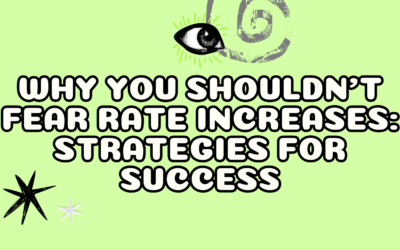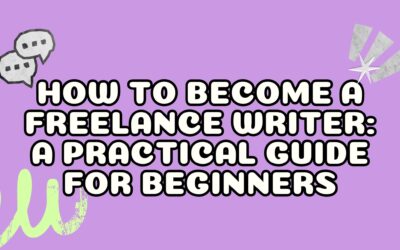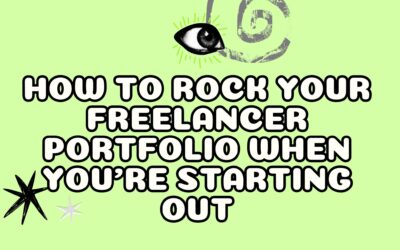One of my favourite things about running Freelance Magic is connecting with new freelancers. I love finding out their current struggles and helping them ease into their new roles.
Because, let’s face it, it’s pretty darn daunting going self-employed.
I know because I’ve been there – of course I have! We all have to start somewhere, and that somewhere feels like a place of no experience and no hope.
When I started freelancing back in September 2014 (wow, I’ve hit my 2-year anniversary – time to celebrate!), I hadn’t written a single paid piece for anyone. Nada.
Yet I thought (or, at least, I hoped), I could make my income for the next 10, 20, or even 50 years based solely off my love of writing and sheer determination.
So, what happened?
Well, to begin with it was pretty damn scary. I had one month to start getting clients before I moved abroad – not much time at all in the great scheme of things.
But you know what? I was determined. I was ready. And I was willing to do everything I could to kickstart my freelance career with an absolute bang.
The Planning Stages
There was a one-month crossover period where I was working my notice at my full-time job and hustling for clients on the side. It was hectic. Not only was I finishing up everything I needed to do at my full-time job, but I was spending my evenings pitching work, and planning all the logistics of moving to Spain.
I was basically running on autopilot, because if I stopped to think about it for too long I probably would have broken down in a mushy mess on the floor.
Those four weeks were so important in setting up my career for success. They helped me get everything in order so I could start landing clients immediately when I moved to Spain.
So what did I do in those four weeks?
I strategically planned. And I pitched like absolute crazy. I found job boards in the depths of the internet and scoured them for hours. I spent days crafting the perfect pitch. I leveraged my social media accounts and started telling people I was now a freelancer for hire.
Here’s the main steps that went down:
1. I Drew on My Experience
“Uh, but you said you had no experience?” I hear you shout. And you’re absolutely right. I had zilch freelancing experience; zilch experience writing for money.
BUT. I had worked in the marketing world for just over 2 years. I knew the ins and outs of SEO and I’d written copy for the travel company I worked for, as well as blog posts, articles, and press releases.
These all acted as collateral and “proof” that I knew what I was talking about.
Make it work for you:
Drawing on your experience doesn’t mean drawing on your freelancing experience because, before you do it, well, you don’t have any experience.
This is where you tap into skills you’ve picked up in previous positions, dive deep into the knowledge you’ve already gained, and consider what it is you really enjoy; what it is your family and friends come to you about.
For me, it was travel. I’d worked for a travel company, I’d done a fair amount of travelling, and I had a little travel blog that I was plugging away at (but it was by no means a success!).
Let’s take a corporate accountant as another example. She might not have any experience writing for clients, but she has in-depth knowledge of the finance industry – she knows the tools top companies use, she knows the lingo, and she knows the ins and outs of it.
This is MUCH more valuable to a client than someone with 5 years’ experience writing about unrelated topics.
So: Think about what knowledge you already have. I know it’s difficult coming from an insular perspective (we, as humans, tend to think our knowledge is nothing spectacular, but you’d be surprised at the amount you know on certain topics compared to others!), but draw on that experience from past work experience or even your hobbies – anyone like knitting, fishing, cooking, or sports?
How this helped me earn $2,000 in my first month:
I pitched a travel company who wanted people to write hotel descriptions for them. In the travel company I worked for, I’d written hundreds of hotel descriptions.
The company wanted “flowery” descriptions that oozed with storytelling, so I also drew on my experience of writing short stories to show that I could combine the factual element of writing descriptions with compelling prose.
2. I collaborated and connected
Let me tell you now, starting freelancing after working in a busy office or amongst other people can be a nasty shock to the system. It’s a lonely old business, and you’ll find yourself spending a lot of time browsing the internet and chatting to other freelancers who are dotted all over the world.
In my first month of freelancing, I made it my mission to connect with as many people as possible, whether they were freelancers or people I’d met at conferences. I made a conscious decision to get back in touch with people and let them know my new path in life.
Guess what?
The simple method of letting my personal social feeds know I was going freelance helped immensely. Someone I met at a conference a couple of years before hit me up with an offer of work which landed me about $300 of that $2,000.
Make it work for you:
Get connected to fellow freelancers in Facebook groups (my absolute favourite for interacting!) and make sure you share your new freelancer status on your personal social media channels. You never know who might be listening and what opportunities they might have up their sleeve.
3. I created a bespoke portfolio
Back when I went freelance, Wanderful World was a little travel blog, where I wrote about my escapades abroad and offered tips and tricks for fellow globe trotters.
This meant I had a backlog of pieces to share with potential clients. But I didn’t stop there. In that first month, I wrote guest posts on other sites to build up my portfolio, as I was acutely aware that all my clippings came from my own site.
I reached out to fellow travel bloggers and asked if they’d be interested in me writing a post for them, and the majority got back to me with a big fat “YES”.
How this helped me land $2,000 in my first month:
I was browsing a job board one day (I think it was ProBlogger), and I came across a posting that was looking for people to write about Bruges.
Lo-and-behold, I’d written a guest post about Bruges that month and could share that and another post I’d written on my own blog about the city. This showed them that I had “insider” knowledge, and allowed me to share a variety of super-relevant samples with them.
This led to a $200 job in my first month (we’re up to $500 now if you’re counting).
Make it work for you:
Guest post on sites in your chosen niches. If you see a job you think you’d be a particularly good fit for but you have no way of proving it, create a bespoke piece from scratch specifically for that position.
In the early stages of a freelancing career, you really have to make yourself stand out, and a bespoke portfolio is a great way to do just that.
4. I used my pitch
Remember that hotel company that wanted me to write descriptions for them?
I actually found them on Craigslist, would you believe it? This meant I knew there would be tonnes of competition, and I didn’t know if my past experience working in a travel company alone would make me stand out.
Because, dear friends, this was a very lucrative position. There was the opportunity to earn £500 a week (about $650) for an unlimited time. I wanted this job. I needed this job.
So I spent a heck of a long time working on the pitch for it.
I thought, if I couldn’t prove I was the perfect person for the job through my clippings, I’d prove it through my writing – in the pitch.
I made sure I answered all their questions and touched on every point they made in the original posting. And I even tried to add in a little creative prose and personality – which, they told me when they hired me afterwards, went a long way!
I’m sure there were plenty more experienced people who applied for this position than me. But I showed that I was committed, understood exactly wanted, and proved that I could marry two skills from previous work experience together to bring them what they wanted.
Make it work for you:
Let’s go back to our corporate accountant as an example. She has the knowledge, and now she has the clips thanks to her bespoke portfolio, so now she just needs to prove to clients she is the freelancer for them – and this lies in the pitch.
You want to use the pitch to showcase your expertise by dropping in some keywords, show that you understand EXACTLY what the client wants (even if you repeat them word for word), and why YOU are the freelancer who can help them (is it BECAUSE of your expertise, for example?).
This hotel description job netted me $1,500 in my first month, bringing the total earnt to $2,000 in my first 4 weeks as a freelancer.
You see – it wasn’t luck or some magical ingredient. Instead, I was strategic in what I did and made sure everything I did was working towards something.






A great success story, congratulations! I’ve given myself over to the keyboard, though closer to my two month anniversary than two years. I’ve writing books and have little time to blog, but I’m getting there.
Thanks, Charles! With every little step you’re taking, you’re making progress 🙂
Very helpful. Thank you!
Glad this was helpful, Anne!
Thanks so much for this. I trie freelancing once, but needless to say it didn’t work out. I may try again after reading this so thanks for sharing.
Clara recently posted…Strawberry Homemade Exfoliating Scrub
It can be difficult to know where to start, but persistence and intentional steps are the way forward! Let me know if there’s anything I can help with, Clara.
Lizzie, this is fantastic! Sometimes freelancing can seem so complicated, but the steps you’ve listed here are actually very simple, yet really actionable. I especially loved your point about using what you know – knowledge is power and if you don’t know where to start, start with what you know!
Thanks, Holly! Yes, simple is definitely key at the beginning otherwise things just get hella overwhelming. Knowledge is absolutely power – I couldn’t have put it better myself 🙂
Congrats on your success! Thanks for sharing the story of how you did it. Excellent tips!
Thanks, Sheila!
This is such an inspirational story, thank you for sharing! Great idea about craigslist – I am going to check it out after I finish writing this comment, ha!
Thanks so much, Nancy! Let me know how you get on with Craigslist 🙂
Lizzie,
I have a question for you. I am planning to start a freelance writing career, I have spent 20 years in marketing. My question is I read about using your blog to attract writing clients. Let’s say I want to attract finance writing clients and I am having trouble figuring out what to write about. Do I write personal finance articles, marketing articles, topics that financial professionals can write about, what type of articles would attract clients? What type of articles do I write to put into a portfolio?
Jenn
Hi Jennifer – sure! There are two options here – you can either create the content that you’d like to create for your clients, so pieces on finance etc. OR, you can create pieces that ATTRACT finance companies – “3 Things Finance Companies Are Doing Wrong With Their Blogs” or the like. It depends what the aim of your blog is – is it to act as a portfolio and for you to build a name for yourself in the industry? Or is it to attract clients as part of your marketing funnel?
Hope this helps!
Lizzie,
Thank you so very much, this was very very helpful.
Jenn
This has come at just the right time for me, as I’m pretty much now where you were then! I even (get this) submitted my first pitch after finishing Module 2 of Launch Your Life. I kept it strategic (they were PAYING people to write about films and I have tons of posts about those on my blog) and tried to inject a little personality! Sure, I probably won’t get it, but I’ve broken the ice and TRIED now – which is all thanks to you!
Woo, go you! Let me know how the pitch goes – if you’ve got loads of samples, you’re in with a good chance. So glad you’re getting things going!
I subscribed to your 5 days challenge. For me it is a bit more difficult as I am not a native english speaker. Any advice would be great!
Amazing news, Otilia! Are you planning on freelancing in your native language or in English?
Such great insight, Lizzie! I, too, am a BIG believer in leveraging any and all past job experiences that you have to help you in running a biz. Everything we have done in our professional careers, good or bad, helps shape us into who we are today.
Thanks, Jessie! And I completely agree – we have a lot more knowledge and skills than we often give ourselves credit for 🙂
Great post, Lizzie! This is my first official month as a freelance writer (although I am still working part-time) and I hope to make $800-1,000 this month! You have given me great tips and inspiration to get started, thank you for sharing 🙂
Thanks, Melanie! I loved reading your comment – that’s so awesome! You’re rocking it in your first month 🙂
This is truly an inspirational post, Lizzie! And congratulations on your two-year anniversary 🙂
I wish I had read this article 3-years ago but it’s still incredibly helpful!
Thank so much, Eden! I wish I had an article like this when I was starting out, too!
Sorry to sound cynical but this just reads like another vague “I made it at freelancing, you can too if you just pay to join my course where I’ll reveal actual actionable insights” post.
Most of this just reads like you were pretty much set for freelancing because you’d written stuff before and knew a lot about SEO/marketing. You also mention these hidden job boards but don’t actually identify what they are.
The truth of the matter is that you’re an outlier if you’re making this kind of dough freelancing. I know because I’m a freelance writer myself and have been for the last 8 months. My most profitable month so far was $1300. Most of us are scraping by. And it’s not for a lack of trying — I send out pitches all the time, most get ignored, some get responded to with the old “you need more experience” crap.
I like your site and I’m not trying to devalue what you’ve done but the hard-hitting truth is that it’s very tough to reach a decent wage at this. I follow many blogs with a similar theme to yours and the people running them all have the same back story — earning sh*ttonnes of money freelance writing, telling readers we can all do it too, then revealing that you entered the industry with loads of samples in your arsenal already, with stellar knowledge of SEO.
Hey Ronan, I’m sorry you feel like this is just another vague post. I’ve seen many other posts like this that are a heck of a lot more vague, but maybe that’s because every freelancer’s journey is different. There is no one way to get into it, no blueprint that fits everyone.
When I mention “hidden job boards” I mean I googled and googled “freelance writing jobs” for hours on end and got taken into all sorts of internet rabbit holes. Most of them were rubbish, some of them had a job or two that I applied for. I’m not trying to keep these from anyone, they’re just job boards I visited once on an endless Google search and wouldn’t be able to find again even if someone had a gun to my head.
I also disagree about being an outlier earning this much (in fact, $2,000 isn’t much at all for a freelancer). I know plenty of freelancers, whether they’re writers, designers, marketers, earning that and more consistently. It takes time to build up and, at 8 months, you’re still fairly new to the game. Freelancing isn’t a get rich quick scheme, so if you really want to be successful you have to put in the hours and the hard work – so much so, that you’ll feel like giving up time and time again to go back to a regular job because it’s so much easier.
I have a question for you: when you’re being told you need more experience, what are you doing to get past that sticking point? Are you writing guest posts and bespoke pieces to build up your portfolio? Are you saying to brands that you’ve only been freelancing for 8 months or are you letting your work speak for itself?
I’ll fully admit I don’t earn tonnes of money, and yes, I did have some experience marketing beforehand, but there are so many people out there who have great experience in loads of different areas – it’s all about leveraging those skills in the early stages, whether you worked for a finance company so have niche knowledge of that industry, or worked in tech so you have some coding experience. My aim isn’t to flaunt want I’m doing, but instead to actively show people that it IS possible – because it really, really is!